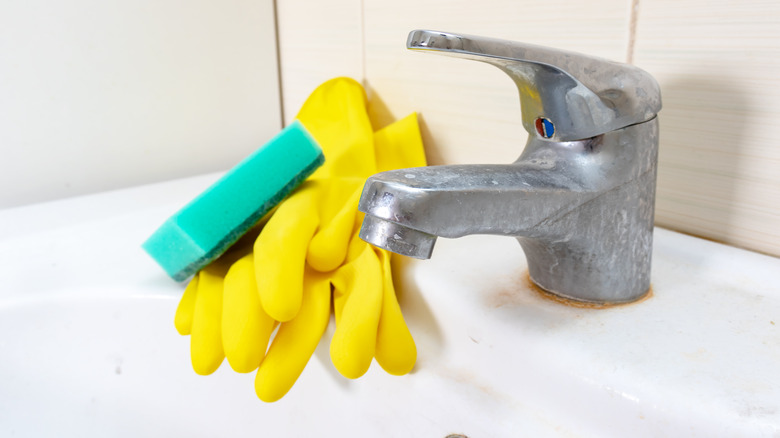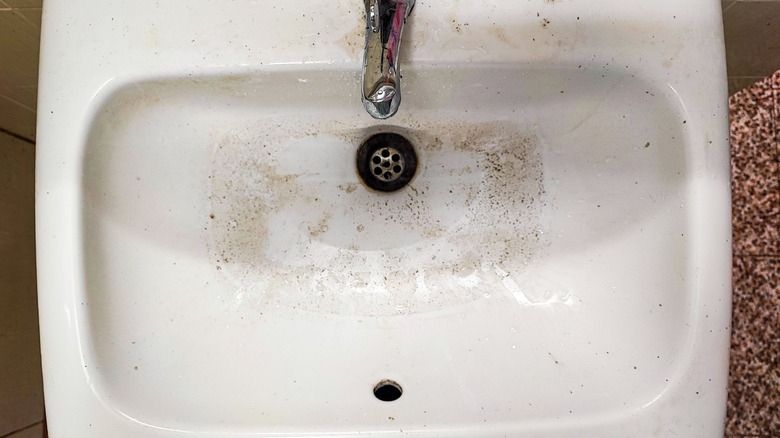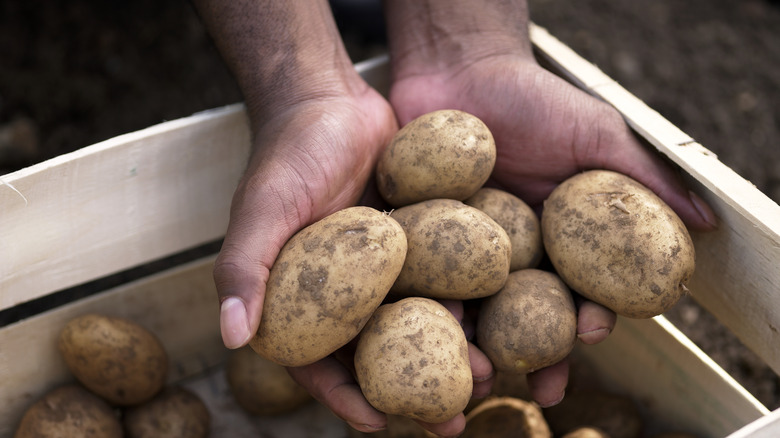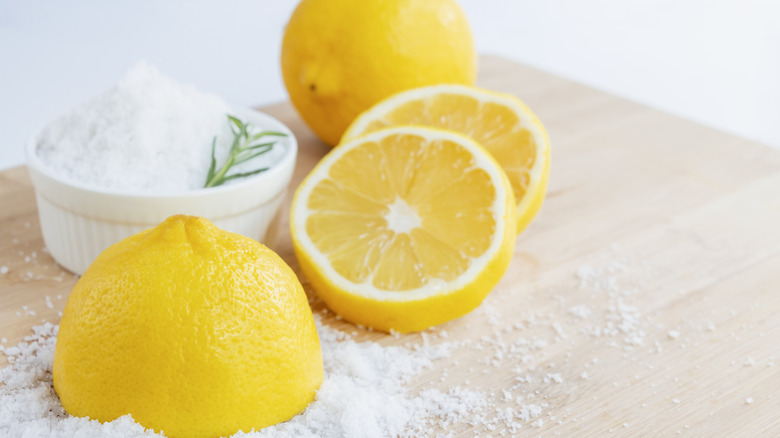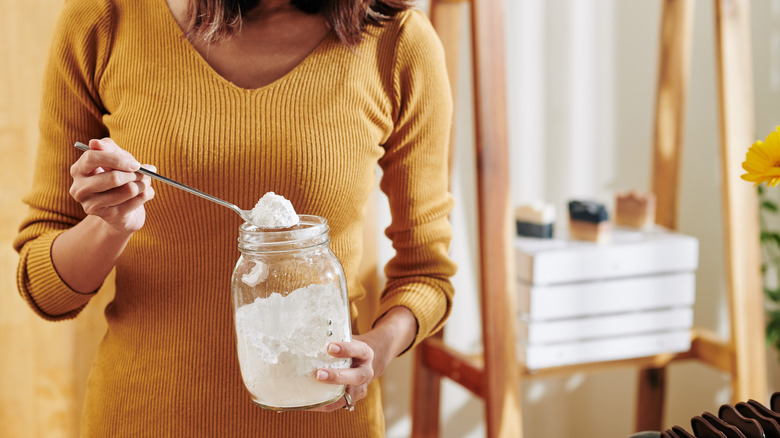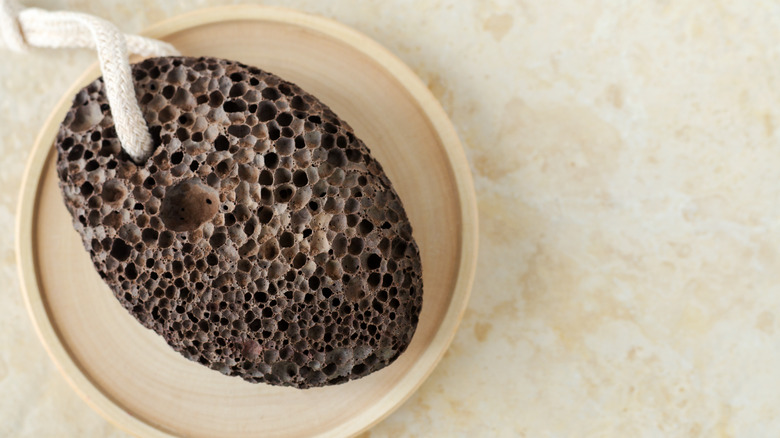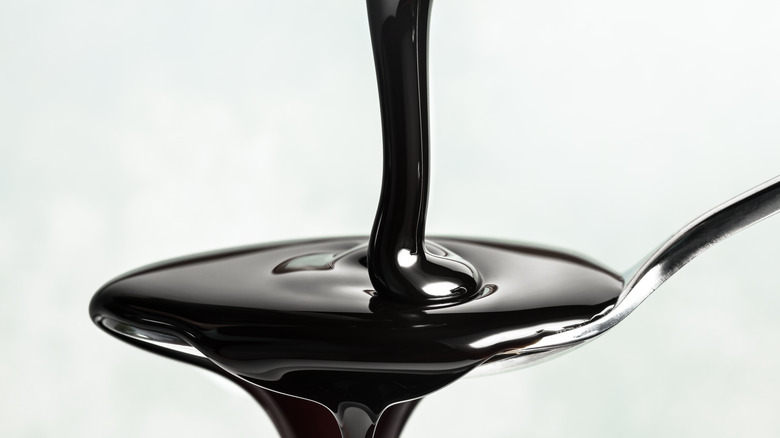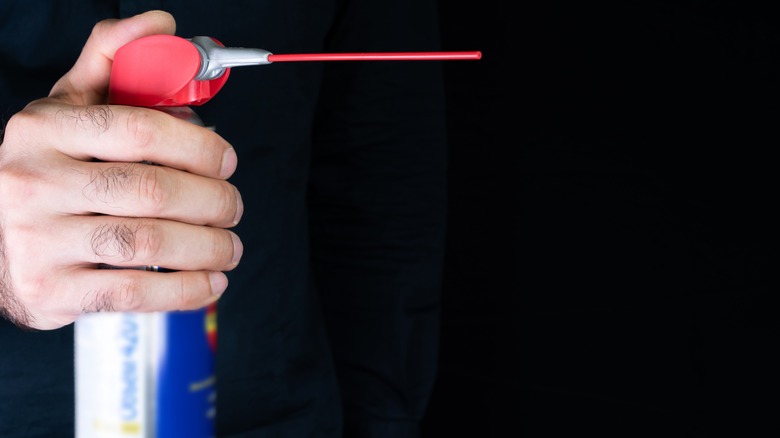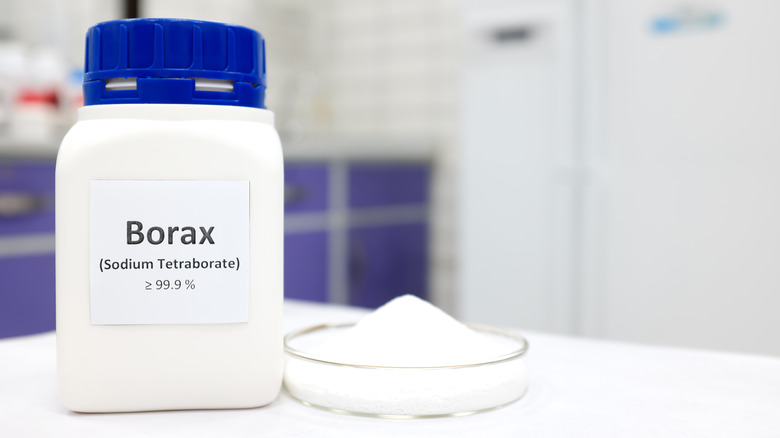Tips And Tricks For Removing Unsightly Rust Stains Around Your Bathroom
Bathroom rust is a very common problem that plagues people everywhere. No matter how diligent you are about regularly scrubbing your bathroom, the reality is that a little rust is unavoidable from time to time. Due to the unsightly, orange-hued appearance, rust stains can also make you feel like your space isn't as clean as you'd like it to be. Although it may seem like these rust stains are just something that you have to live with, that isn't the case at all.
Rust, also known as iron oxide, forms when metal corrodes. Because oxygen and water are essential for the corrosion, bathrooms make perfect breeding grounds for rust. However, not only are there things you can do to remove rust stains in your bathroom, but you may already have many items lying around your house that can help. While some of these methods are based on anecdotal evidence and the results of social media influencers experimentation, others are backed by science. Keep reading to learn about some of the best tips and tricks to remove those stubborn rust stains from your bathroom.
Stained sink? Vinegar can help take care of that
Vinegar may be something you're only used to reaching for in the kitchen. However, it can also come in handy in your bathroom. Vinegar can be a powerful tool to help remove rust stains from your sink. All you need to do is this: Mix three parts vinegar and one part water in a spray bottle. Spray your sink (or any other rusty area in your bathroom) with the mixture, and let it soak for a few minutes. Then, scrub the area with an abrasive tool, such as a Brillo pad. If there's still a little rust left behind after following these steps, you may want to repeat the process.
This method works due to a process called neutralization. Vinegar's pH is around 2-3, while rust's pH ranges from 5.5 to 8.2. When the acid in the vinegar meets the base in iron oxide, it creates a salt-like substance that can be easily removed. That being said, it's important to note that the vinegar alone won't make the rust disappear, which is why it's important to scrub the area thoroughly after letting it soak, and then wiping away the residue to ensure the rust is removed.
Add a potato to your cleaning recipe to keep your tub rust-free
Putting a potato in your bathtub (or anywhere else in your bathroom) has likely never crossed your mind, but that's about to change. One of the world's most beloved starches can also double as an excellent cleaning agent for removing rust. All you need to do is cut a potato in half and coat the cut side with a mild abrasive, such as salt. You can then use the potato as a scrubbing tool to remove the rust inside of your tub or other areas of your bathroom. In fact, it might be the perfect tool to scrub with if you decide to use the previous vinegar method we mentioned.
So, why does a potato make the perfect match to fight rust? It's because potatoes contain oxalic acid, which makes insoluble iron soluble. This transformation is what makes rust easy to dissolve. Oxalic acid is a very common ingredient in many cleaning products, such as Oxiclean and Bar Keepers Friend. By using a potato, you're getting oxalic acid straight from the source!
Lemon and salt can have your bathroom shining like new
Have your previous rust removal attempts left you feeling lightheaded after using chemical-heavy cleaning products, only to still be left with terrible stains? You'll be happy to know that you can officially kiss those days goodbye. Salt and lemon are the perfect natural pairing for removing tough rust stains with ease. Simply add equal parts lemon juice and salt to a bowl to create a paste-like substance. You can then dip a rag or an abrasive pad into the paste and start wiping the rusty areas in your bathroom.
The acid in the lemon juice helps to separate rust from the surface of your bathroom, which makes it easier to wipe away. The salt acts as a mild abrasive, which aids in the scrubbing process. It's important to note that if you have sensitive skin, you may want to wear a pair of gloves to avoid any irritation from the salt.
Did somebody say baking soda?
Baking soda is a popular kitchen product, most commonly used to help baked goods rise. But did you know that it's also a powerful household cleaning agent, and it can be especially useful against rust? By mixing baking soda with water, you create a paste that you can use to scrub rust from the surfaces in your bathroom. Similar to the previous method, you can then scrub the paste on the affected areas to remove the rust. Using an abrasive pad will give you the best results.
While there doesn't appear to be any chemical connection between baking soda and rust, this method works because baking soda is abrasive, which can help loosen and lift rust when rubbed onto the surface. Since removing rust this way requires a good amount of time and lots of elbow grease, it's best when employed on smaller rust patches, as opposed to large rusted surfaces.
Pumice stones aren't just good for your feet!
Anyone who has ever dealt with dry or dead skin on their feet knows just how handy pumice stones can be. However, these stones aren't only for helping you remove the calluses from your feet; they can also help you remove the rust from your toilet. All you need to do is get a clean pumice stone and soak it in a bowl of warm water for a few minutes. During this time, you'll also want to ensure that your toilet bowl is fully wet. Grab the stone from the water and use it to gently scrub the rust ring in your toilet. Ensuring that the toilet bowl is wet before scrubbing can help prevent scratches.
The stone's abrasive surface can help loosen and easily remove rust from your toilet and other surfaces in your bathroom. It's important to note that you'll want to use a pumice stone labeled as "natural," as it will be gentler on your toilet bowl.
Rust won't be sticking around with a little help from molasses
Molasses has been a common cooking and baking ingredient for hundreds of years. But despite its popularity in the kitchen, not everyone is aware that it can also be used for cleaning. Combining molasses with water can create a mixture that is tough against rust, using a ratio of one part molasses tp eight-10 parts water. Soak the affected area in the mixture and then wipe and rinse. Since the solution will primarily be made from water, you shouldn't have to worry about leaving a sticky mess behind.
When molasses and rust come together, a process called chelation occurs. The chelating agent in molasses contains molecules that bind to the rust and dissolves it, making it easier to remove. It's important to note that molasses should only be used on iron surfaces, as it could possibly be damaging to other metals. In addition to being cost-effective, this solution is also great in a pinch since many people already have some molasses in the kitchen.
WD-40 for the win!
Squeaky hinges aren't the only things that don't stand a chance against WD-40. This beloved product can also help you get rid of rust stains in your bathroom and other parts of your home. Spray the product on the rust and let it sit for a few minutes before gently scrubbing the area with a mild abrasive. The company suggests using a toothbrush when scrubbing drains and/or faucets.
According to the official WD-40 website, the product works on rust because, "Its lubricating qualities loosen the bonds between the rust and the metal surface it has adhered to. And because it's also a moisture deterrent, it offers temporary rust protection after its initial use." While the original WD-40 product works well against rust, the brand also makes a product called Rust Remover Soak that was specifically designed to remove rust, which may be a better fit for particularly large rust stains.
Rust be gone with a little Borax
Borax is a tried and true household cleaning product that has helped keep homes spotless for generations. That said, there's a good chance you're already using Borax to clean your bathroom. However, you may not have thought to give it a try on those annoying rust stains that have been staring back at you for the last few weeks. Now is the perfect time to change that. Grab a bowl and pour in equal parts Borax, water, and lemon juice. Mix them until the ingredients turn into a paste-like consistency. Apply the paste to the rust and let it sit for about 20 minutes before rinsing.
Oxidation occurs when Borax comes in contact with rust, which creates a protective layer on the metal surface that prevents rust from forming and makes existing rust easier to remove. If you're dealing with some serious rust stains, this method could definitely be worth your time and effort.
